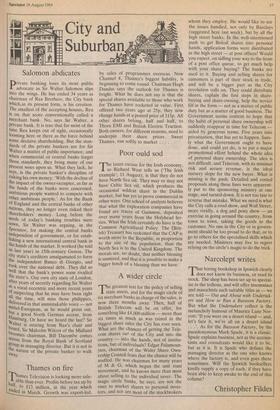A wider circle
rr he greatest test for the policy of selling 1 state assets, and for the magic circle of six merchant banks in charge of the sales, is now three months away. Then, half of British Telecom will be on offer, for something like £4,000 million — more than six times as much as was raised in the biggest share sales the City has ever seen. What are the chances of getting the Tele- com shares out of the City and into the country — into the hands, not of institu- tions, but of individuals? Edgar Palamoun- tain, chairman of the Wider Share Own- , ership Council fears that the chance will be muffed. He was chairman for many years of M & G, which began the unit trust movement, and he knows more than most about selling to the individual saver. The magic circle banks, he says, are not the ones to market shares to personal inves- tors, and nor are most of the stockbrokers whom they employ. He would like to see the issues handled, not only by Barclays (suggested here last week), but by all the high street banks. In the well-intentioned push to get Britoil shares into, personal hands, application forms were distributed in the high street — at post offices! Would you expect, on sidling your way to the front of a post office queue, to get much help with your share buying? The banks are used to it. Buying and selling shares for customers is part of their stock in trade, and will be a bigger part as the City revolution rolls on. They could distribute shares, explain the first steps in share- buying and share-owning, help the novice fill in the form — not as a matter of public duty but as a matter of good business. The Government seems content to hope that the habit of personal share ownership will suddenly reappear in time for Telecom aided by generous terms. Five years into privatisation, that has yet to happen. Sure- ly what the Government ought to have done, and could yet do, is to put a major promotional effort behind the whole idea of personal share ownership. The idea is not difficult, and Telecom, with its minimal risk and secure revenue, is the ideal nursery slope for the new buyer. What is missing is the push. Detailed and costed proposals along these lines were apparent- ly put to the sponsoring ministry at one stage, and turned down. It is not too late to reverse that mistake. What we need is what the City calls a road show, and Wall Street, more vividly, a dog and pony show — an exercise in going around the country, from town to town, taking the goods to the customer. No one in the City or in govern- ment should be too proud to do that, or to go to others for the specialised skills which are needed. Ministers may live to regret relying on the circle's magic to do the trick.






































 Previous page
Previous page